Collages Read online
Page 9
Then she talked about the Consul. The pattern of their marriage was frayed. The silver, gold, purple, red and green threads were worn away. What was left was her knowledge that he was possessed by his mother’s spirit who had willed him first of all to be a war hero, then to surpass Don Juan with women. He had dutifully proceeded to fulfill all her wishes. He had brought her his war scar and his medals. But before he could present her with his prize for the best novel of the year, she had died.
The Consul’s wife had played the role of substitute mother almost to perfection. She admired military prowess, she collaborated in his writing, she took pride even in his lover’s prowess. She shared his love of politics, history, languages. She was at one with his ambitions. Her English coolness saved him from tears and clinging. She thought they would remain life companions if not bed companions.
Every scene between them was a witty charade. She always held the door open and he never left.
But it was only in Los Angeles that he began to talk about adopting a daughter. All these years while they traveled and he wrote his books, he had not thought about children. But now he felt he needed a daughter.
The Consul’s wife had smiled and said: “That should be simple nowadays. There are so many orphans in the world, in Korea, in Hungary, in Poland.”
But the Consul protested: “Oh, no, oh, no. I don’t want an undernourished, a deficient, pathetic, anaemic war victim in the house. I want a tanned, healthy, American child.”
The Consul’s wife was telling Renate and Bruce this story. “He means Lolita,” said Renate.
The Consul’s wife remembered that in Turkey in moments of crisis, she had smoked opium. The poet Michaux had described how it was hashish which gave the illusion of levitation, and that it was from taking the drug that the legend of the “flying carpets” had originated. It was a flying carpet she needed now. But she knew of no opium den in Los Angeles, so friends gave her a tranquilizer.
She lay on her canopied bed and waited for its effects, waited to be wafted away from the Consulate.
“The opposite happened. I felt myself growing heavier and more passive. I felt myself turning into a white slug.”
In spite of the tranquilizers, the Consul’s wife realized that the adoption of an American daughter, a healthy American orphan, had subtly developed into an expedition into the realm of nubile youth from which he might never return, for it was he who had been adopted by a young film star. She began to wonder if their story were finished.
She remembered a day in Morocco, when she sat in a café and while waiting for the Consul to end a conference, had been embroidering a petit point tapestry. The Moroccans had gathered around her to watch her as they watched other craftsmen working the streets. She was using all the colored wools they loved, and her needlework was nimble. She worked on a small square and was but halfway done. One of the Moroccans in long black robes, with a dignified bearing, bent over her and whispered: “Would the lady give me this embroidery in memory of her fair hands at work? I have never seen such fair hands at work.”
The Consul’s wife had been startled by the request. She had never parted with her embroideries. They covered all the chairs at the Consulate for many years. And all she could think to say was: “But it is not finished.”
The Moroccan did not ponder this very much or very long. He almost immediately answered: “But dear lady, according to the Koran, nothing is ever finished.”
Nothing is ever finished.
Yet there at her feet lay an open magazine with a photograph of the Consul and the young film star in a gondola in Venice. And the young film star had commented to the press that she did not believe in the European system of a wife and mistress in close collaboration.
Nothing is ever finished. As they had always shared and paralleled their interests, the study of dialects from all the provinces of India, the Tibetan Book of the Dead, the history of Turkey, the classification of Arabian war cries, the history of rugs and pottery of Egypt, the history of ship building, birds of Africa, diseases of Tahiti, would she now parallel his experience and fall in love with someone like Bruce, the masculine counterpart of the Consul’s new love?
Could she love such an unstormy sky as his eyes, such a downy and untarnished skin, such a candid smile?
The man she carried in her mind at the moment was a Turkish war hero, a dark and wild man. She was writing his biography. The magnetic pull of his violence was greater than that of innocence and serenity.
A romance with a man who had died long ago promised at least no pain, no separations, no betrayals.
She boarded a plane to his native city.
Few people knew about him, but she knew him as well as if she had been his wife. She was adept at resuscitating a human being out of dusty books and files and letters in library vaults.
When she arrived at the Capitol, at the big hotel, she asked about ways to reach the village birthplace of Shumla. She was told she would have to wait for a guide, that no woman could travel there alone, and that it was the middle of the day, time for a siesta and that she should rest and wait.
But she could not sleep, and she could not wait. The photograph of Shumla which she carried in her wallet was so vivid, so alive, that she felt as if she had an appointment with him which could not be postponed.
She slipped out of the hotel and walked to the bus stop, asking her way. The buses were taking their load of men, women, babies and animals. She was the last to climb on. She was the only pale, fair-haired woman aboard.
Nothing is ever finished. The Consul was walking into the future with his young film star, learning to dance jazz in caverns without windows, studying The Dictionary of Slang, helping to compose instant films; and the Consul’s wife was retrogressing to the seventeenth century. Was this a form of faithfulness in her?
The bus jogged along. She was not treated like a tourist as her clothes were loose, crumpled and anonymous. She asked the conductor for Shumla’s village. He was surprised she would want to stop there. A small village, half in ruins. No foreigners, no hotels, no guides. She persisted and he stopped the bus. The road was white with sun and dust, as white as a ski slope. The stones like chalk. No shade from the silvery, denuded, thirsty pepper and olive trees. A few women in black carrying baskets and pottery, or standing by the well. Streets of earth or rough stones. Her heel broke. She tore both heels off. She wrapped her neck scarf around her hair. She walked alone while half of the village slept through the heat of noon. Now and then she stopped to ask someone: “The house of Shumla?” Some would look blank and suspicious. Others pointed the way. It was outside the village. From inside the shops whose entrances were covered with strings of beads which sang in the breeze, people watched the pale-faced woman stumbling over stones. She finally arrived at a group of half-ruined houses. There was no sign. But someone said: “That’s Shumla’s house.”
The big wooden door was open, because the hinges were half rusted and half gone. The house had been built around a patio. The garden was taken care of; it had flowers and bushes and fruit trees in bloom. But the rooms were in ruin. There were vestiges of murals. A few broken colonnades. The ceilings were gone, and trailing plants fell from the beams. The heat like a hypnotist made everything stand still as if deep in sleep. No leaf stirred. No voices were heard. His presence, six feet of dark brown flesh, heavy black hair and strong voice must have filled the fragile place. It was no wse e that though born there, he had run away to fight wars. And only came home to die.
His religion forbade biographies, photographs, records of personal lives. So she had found little to reconstruct his life. Whoever thought about him, or tried to make a living portrait of him would be struck with misfortune. But the Consul’s wife felt that having already suffered a loss, she could not be cursed any further. What else could happen to her? So she was fearless. She sat on one of the stone benches and tried to relive his life. Ill, dying, he must have listened to the sound of the trickling
fountain. He did not die in the middle of battle. Did he regret this? Charging, screaming, with a curved sword held high above his head, he might have died then. Who had been there to hold the large, heavy head? As she said this she heard footsteps. A figure dressed in black appeared behind a column. It was a girl about fourteen. Her face was dark, her eyes of a highly polished black. But her mouth was tender, and a soft smile never quite left her lips.
“I came to see the house of Shumla because I am writing a book about him.”
“But it is forbidden,” said the girl.
“In your country, yes, but outside your country people think he was a great man, a hero, one of the bravest, and they would like to know about his life.”
“People dared to write about him?”
“Not his own people, but scholars and historians. They are embalmers. They are taxidermists. I wanted to write about the living man. I loved him. What do they know about him here in the village?”
“He was born here, in this house. I am a descendant of his. His great grandchild looks like him, they say. Come in and have tea with us.”
At the back of the house in ruins, in a wing preserved from decay, she found a complete family, great grandparents, silent and like mummies, grandparents, grandchildren.
They served her tea. They read her manuscripts. They said: “You have been truthful. You have not done him harm. You really know him.” It was the young girl who knew English and who translated it for them.
They invited her to stay a few days.
She slept in his bed. She saw his costumes, his swords, his knives, his shoulder bags, his bugle, his horse’s saddles and silver ornaments. She saw his boots, his shawls, his tents, his carpets for sleeping, his blankets for the cold, his fur-rimmed hats, his necklaces, his medals, his spurs.
The great grandchild who was said to look like him, like Shumla at fifteen, loved horses and war, and could reproduce the special cries they had for battle. He sang the songs they sang around the campfires.
She saw the rough maps he had used, the rough notes, the messages, and many drawings of the period which portrayed battles, executions, punishments, ceremonials, victories, banquets, weddings, burials, decorations of heroes.
There were no clocks in the house, no calendars. It facilitated her return to the past, a long journey. It washed away the years from her body.
She lived with Shumla; he visited her in her dreams. Even though the times dictated ferocity towards the enemy and no mercy towards prisoners, his obedience to them had been tempered with as much mercy as he could display without being branded a woman.
She took many notes from their stories. She convinced the family that Shumla, as a symbol of courage, belonged to the world, that it was not desecration to expose his life.
The old people had a wonderful memory. They remembered every detail they had heard, the color of his horse, the color of his belt, the number of beads on his necklace for luck, the names of his comrades, his friends, his relatives in other countries, the name of every battle, of every place where he had been.
When she left them, they made her promise to return. She carried a brief case filled with precious notes, letters, sketches. She had an intimate knowledge of the man. His stature, his fierceness, his valor made the modern world seem tame and fearful.
But the plane caught fire a few minutes before they landed. The pilot sent messages through the intercom. “If we can land before the second motor catches fire we will be safe. We only have four minutes to go. Please do not panic.”
One minute. Two minutes. Three minutes. Four minutes. They landed and stepped out through the emergency door. A fire engine and an ambulance awaited them. The plane was emptied without accident, but the fire raged after they left it, and in this fire burned the intimate personal data on Shumla which his jealous religion, his jealous gods, did not wish to release to the press, to the world, to women like the Consul’s wife who committed adultery in their dreams.
COLONEL TISHNAR CAME TO PARADISE INN for dinner. If Renate had wanted to make a portrait of him it would have had to be a collage for he seemed made of all textures except human skin, human hair. His white hair could have been made of spun glass, his skin of sand-colored suede, his slim military figure of some new suave plastic.
His language too was stylized and every word glazed with patina. Long service with the British Intelligence Service had given him a stance which reminded one of photographs of T. E. Lawrence. He had known Lawrence, and shared with him a love of adventure, freedom, exile and poetry.
Colonel Tishnar had the gift of distilling from his own life only the humorous aspects. Having excluded illness, danger, tragedy, and personal relationships, his life appeared enchanted and pure fiction. His stories were perfect for dinner parties and they disturbed no one’s digestion.
This evening he was a guest of a famous producer and they were planning to go on a safari together. The producer was asking him about the idiosyncrasies of lions.
“Well,” said Colonel Tishnar, “I can tell you one story which will give you an idea of the fastidiousness of lions in general. Did you ever know Mrs. Larrabee? I was with her on a safari. Mrs. Larrabee had never resorted to the magic of dress or cosmetics, to any artificial effort to reconstruct herself. She may have decided at the beginning of her life that no charm or art could enhance her bold features, her straw-dry hair, her skin grained like sandpaper. We were lion hunting in Nairobi. As you probably know, the rule in this sort of hunting is to remain in the jeep and to keep on driving. Two natives accompanied Mrs. Larrabee, one to drive the jeep, the other to carry her gun. Somehow or other, her jeep became separated from the rest of the caravan. When it reached a shallow gully the engine stopped. While it was being repaired Mrs. Larrabee went for a walk along the bank. She was far out of sight and walking back meditatively when she noticed across the dry river bed an enormous lion walking parallel to her at the same pace. Mrs. Larrabee remained calm. She continued to walk towards her jeep. So did the lion. They both reached a bend in the gully. Towards the right was the road back to the jeep.
“Towards the left was the jungle. And here the lion calmly walked into the jungle and disappeared. But before the parting of the ways he looked at Mrs. Larrabee rather wistfully, as if to say goodbye. Mrs. Larrabee told me the story. She wanted me to explain what had saved her from being devoured. I could not explain it. The lion may have decided that Mrs. Larrabee’s skin and boniness belonged to a new species of animal which did not tempt him. It may have been that he had already eaten and that there was nothing here to stimulate his appetite. Anyhow, what I could not tell Mrs. Larrabee was that if I had been the lion, and if I had met her walking along the edge of that gully, I too would have continued to walk in the opposite direction, wouldn’t you?”
Once during the evening he paused in the middle of a story as if the end were no concern of his, and he had to be reminded to continue until he reached the climax.
“The end, you want an end,” he said. “It may be I have lived too long with the Moroccans, and I have come to believe as they believe that nothing ends, nothing is ever finished.”
“What about the adventurer’s life? Does he always remain alone? Will you every marry?”
“I could only marry if I could find a woman who has had as rich a life as mine. Then I would be willing to stay at home, and sit by the fireside, and we would both tell each other of our endless adventures and relive them all.”
“I know exactly the woman for you,” said Renate. “She has had as adventurous a life as yours. T. E. Lawrence carried her books of poems with him, she visited him in the desert, and I am sure you were at the same places, knew the same people, made the same voyages.”
“But never at the same time,” said Colonel Tishnar. “This lack of synchronization augurs badly for a marriage. Already I ask myself was she always late? I never could bear to wait for a woman.”
“She has just arrived,” said Renate.
<
br /> Tessa’s dress was airy, of a black transparent material stiffened by chemistry as organdie had onc been by starch and ironing. It gave her the crisp silhouette of a young woman. The enormous bow on her breast seemed like wings which would carry her off at any moment. Her hair, though grey, was glossy and electric, and the ends curled in the air like feathers at full mast. Her dress, the stance of her high-heeled shoes, reflected the alertness of her spirit. Her laughter and her voice were young and supple. Age could wrinkle her skin, freckle her hands, ruthlessly weigh down her eyelids, but it could not deaden her fervor, her mobility, her obedience to every challenge of life.
As soon as she was introduced to Colonel Tishnar she began a story: “I have just come back from my gold mine in Ghost Town. I bought it when they discovered a cheaper way of treating the low grade ore discarded by the old miners. All I have to do is climb a ladder down the shaft, from my very own cellar, pick up enough ore, treat it in this new acid, just enough of it to spend in the evening at the famous gambling table of the old pioneers. Ghost Town is coming back to life. The old saloon is still decorated with red damask walls and a crystal chandelier brought from France when wealth first came to the miners. One can live and gamble on ten dollars a day. I am going to invite all my artist friends to come and live with me there. The only difficulty with this plan is that I have lost their confidence. During the war I offered some of the homesick surrealists a way to sail back to Europe. I bought a ship for them at auction. It was in New Orleans. And I invited all those who wanted to sail to come with me. But the ship sank in the harbor, before they even boarded it. Some of them may have thought it was a plot against surrealism.”
When Tessa left, Colonel Tishnar whispered to Renate: “What a pathetic woman. All flutter and furbelows, no meaning to her life, all chaos.”
Renate spent a sleepless night. For she knew that Tessa, too, had been searching for the man who had enough stories to tell to make their staying at home not seem like a retirement from active life. And she was ill with a bad heart. How could Renate inform her that Colonel Tishnar had decided to leave that very day for India? Could her old heart bear this defeat, she who was not familiar with failure? She would expect Colonel Tishnar to call her up. Her charm had never failed. But it was Renate who called in her warmest, most exultant voice: “Colonel Tishnar thought you absolutely charming, too charming in fact. He told me you reminded him of his dead wife, who made him suffer a great deal and who was unfaithful to him. He is leaving for India. He told me you are far too dangerous for his peace of mind.”

 Diary of Anais Nin, Volume 5
Diary of Anais Nin, Volume 5 A Spy in the House of Love
A Spy in the House of Love In Favor of the Sensitive Man and Other Essays (Original Harvest Book; Hb333)
In Favor of the Sensitive Man and Other Essays (Original Harvest Book; Hb333)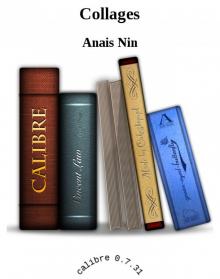 Collages
Collages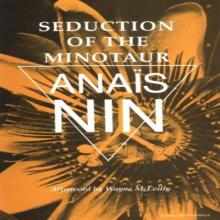 Seduction of the Minotaur
Seduction of the Minotaur Children of the Albatross
Children of the Albatross Delta of Venus
Delta of Venus The Four-Chambered Heart coti-3
The Four-Chambered Heart coti-3 Diary of Anais Nin, Volume 2
Diary of Anais Nin, Volume 2 Diary of Anais Nin, Volume 1
Diary of Anais Nin, Volume 1 Diary of Anais Nin, Volume 4
Diary of Anais Nin, Volume 4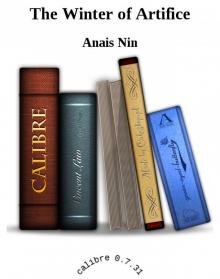 The Winter of Artifice
The Winter of Artifice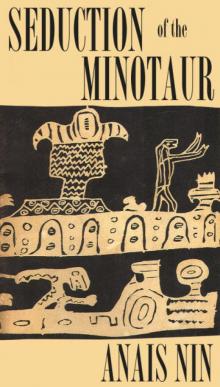 Seduction of the Minotaur coti-5
Seduction of the Minotaur coti-5 Children of the Albatross coti-2
Children of the Albatross coti-2 Henry and June: From A Journal of Love -The Unexpurgated Diary of Anaïs Nin (1931-1932)
Henry and June: From A Journal of Love -The Unexpurgated Diary of Anaïs Nin (1931-1932) Ladders to Fire
Ladders to Fire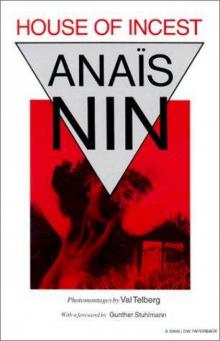 House of Incest
House of Incest